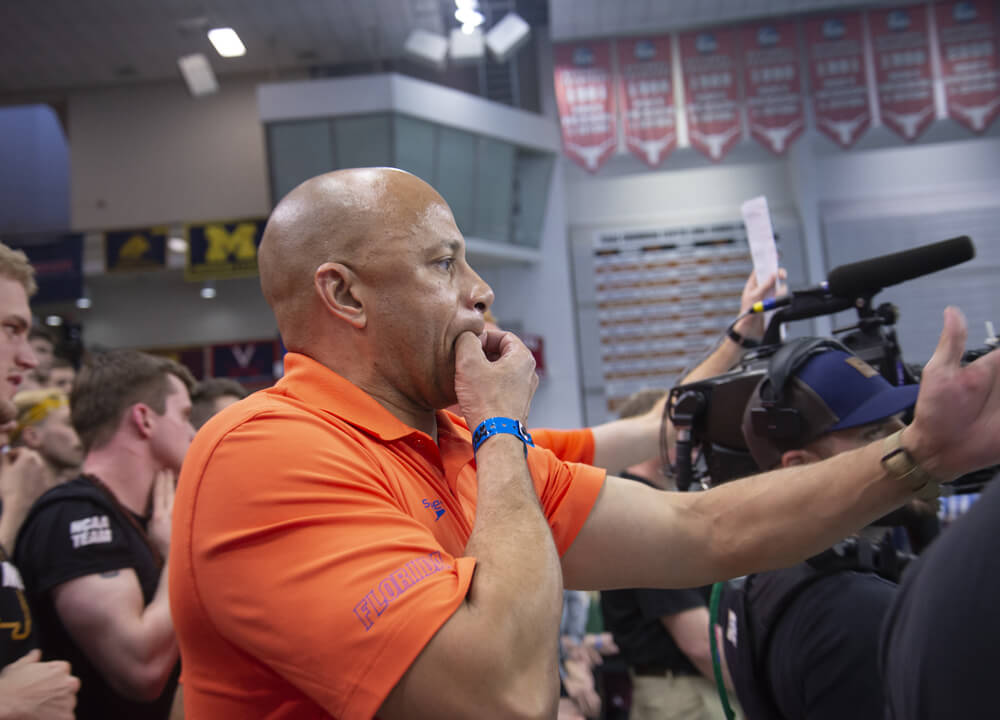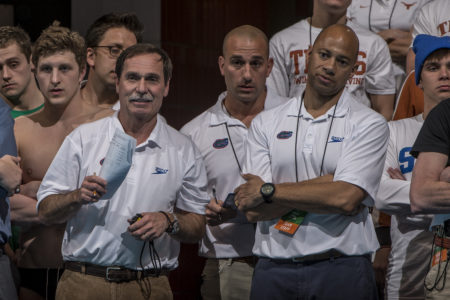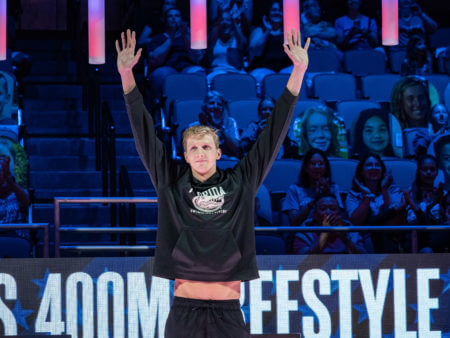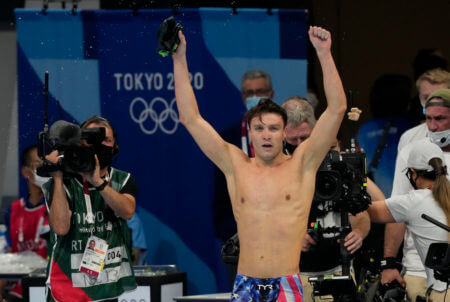Anthony Nesty Continuing to Make an Impact as Emerging Coaching Great

Anthony Nesty Continuing to Make an Impact as Emerging Coaching Great
(From November’s Swimming World Magazine)
Anthony Nesty’s accomplishments as a swimmer in the late 1980s and ’90s made him a national icon. But decades after that, he is still making a huge impact on the sport from a different vantage point — as a coach.
**********
Even as a teenager, Anthony Nesty was already the finest swimmer Suriname had ever produced. He was winning races around the Caribbean and in South America, and he had even qualified for the 1984 Olympics in Los Angeles, where he placed 21st in the 100 butterfly.
But Nesty knew that sports careers in Suriname were typically finished right around the time an athlete finished high school, so Nesty’s father decided that they should look to the United States to help Anthony take his career to the next level.
That led Nesty to the Bolles School, where he swam for Coach Gregg Troy. Thinking back on his first experience in the U.S., Nesty remembered a moment during his senior year championship meet when he swam the 50 free and missed out on a victory. Nesty believed he should have won the race, and after he finished, he realized he needed to walk off by himself for a moment to collect himself. When he raced again in the 100 fly, he broke the national record.
“The resilience of an athlete screwing up one of his events and coming back and putting that event aside and kicking that second event into another gear, I think that was one of the biggest breakthroughs of my swimming,” Nesty said.
A Miracle Finish in Seoul
Nesty’s rise culminated at the 1988 Olympics in Seoul, South Korea, by which time he had enrolled at the University of Florida. He was already a gold medalist at the Pan American Games, an established swimmer at age 20. He qualified for the 100 fly Olympic final, and after a slow start, he put himself in position to win a medal with 25 meters to go. Coming down the stretch, Nesty was locked in a battle with Australia’s Jon Sieben and Great Britain’s Andy Jameson for silver as American Matt Biondi pulled away. Even with five meters to go, Biondi still had a half-body length lead.
But then, in a miracle finish, Nesty got in ahead of the famed American. Biondi glided to the wall and picked his head up while Nesty took an extra stroke to help him finish on the right cycle. He swam a time of 53.00, an Olympic record. He was a gold medalist.
“I always felt I was capable of doing special things. I’m not saying that to be cocky,” Nesty said. “The Olympics is the pinnacle of our sport. Any athlete, that’s what they want to do. Obviously, it’s tough to get there. Getting there is one thing, and performing when you get there is another.”
Nesty came through, and he won the first Olympic medal in any sport for Suriname. In fact, he is still the only athlete from Suriname to stand on an Olympic podium. He did so twice, as he returned to the Games four years later in Barcelona and picked up a bronze in the 100 fly, less than a tenth behind gold medalist Pablo Morales.
Coach Nesty
When Nesty graduated college, he quickly ended up back on the pool deck as a coach.
“I didn’t know what to do,” Nesty said of his career choice. “I wanted to stay in the sport as best as I could, just to give back and help an athlete experience the same things that I went through. I just wanted to help kids get better.”
Nesty returned to Bolles to coach for a few years, and then he ended up as an assistant at Florida in the summer of 1998. One year later, Troy was hired as the head coach of the combined women’s and men’s programs, and he retained his former swimmer on the Gators’ staff. During that time as Troy’s assistant and then as associate head coach, Nesty helped coach the many legendary swimmers who passed through the Florida program, including Ryan Lochte, Gemma Spofforth, Elizabeth Beisel, Caeleb Dressel and more.

Gregg Troy (left) and Anthony Nesty (right) during their years coaching together at the University of Florida — Photo Courtesy: Peter H. Bick
Along the way, he refined his coaching philosophy and tactics. He followed Troy’s leadership, but also considered how he would manage a program should he ever have the opportunity. “Throughout the years, I’ve had a lot of notebooks, things to do and not to do,” Nesty said.
After the 2018 season, Troy announced his retirement from college coaching, and Nesty interviewed to replace him. “I went into the interview like I was swimming the 100 fly at the Olympics. I was prepared. I knew this was the job I wanted.”
At that point, Florida decided to split its women’s and men’s programs, and Nesty was named head coach of the Gator men. Nesty’s coaching philosophy includes very specific ideas about the paces he wants swimmers to achieve in practice, and each practice complements the one before. “You miss one of those, you missed the boat,” he said.
In his first year, Florida won its seventh straight SEC title, and that streak has now reached nine. Despite graduating Dressel and fellow lights-out seniors Jan Switkowski and Mark Szaranek the season before Nesty took over, the Gators dropped only from fifth to sixth at the national championships in 2019. After the COVID-19 pandemic forced the cancellation of the 2020 meet, Florida improved to place third at the meet in 2021, an effort spearheaded by a pair of impressive juniors, Kieran Smith and Bobby Finke.
In 2021, Smith won the national title in the 200 free. He finished second in the 500 free (an event where he is the fastest swimmer in history) and sixth in the 100 free. Finke won national titles in the 400 IM and 1650 free, just missing his American record in that mile, and he was sixth in the 500 free.
On to Tokyo

Kieran Smith, coached by Anthony Nesty, won the 400 freestyle at U.S. Olympic Trials — Photo Courtesy: Peter H. Bick
Three months after that, both of those men qualified for the U.S. Olympic team, Smith as the winner of the 400 free and 200 free at Olympic Trials and Finke as the dominant swimmer in the 800 free and 1500 free. And Nesty would be there in Tokyo to watch and to guide his athletes. He had become a U.S. citizen in 2006, and for the first time, he served as an assistant coach on the U.S. staff for the Tokyo Olympics.
“I knew if they swam well at Trials, they would have a good shot of making it,” Nesty said. “Once they made the meet, now we’re thinking, ‘OK, can we get to the next level?’”
The early analysis of those four races was not pretty for the U.S. team. No American had won a World Championships medal in any freestyle event 400 meters or longer in either 2017 or 2019, and no American even qualified for the 200 free final at the 2019 World Championships. So Nesty created a training plan for Smith and Finke designed to help them visualize reaching the times they would need to win Olympic medals.
“Those two guys, in Hawaii (at training camp), they were smoking. Number one, they had a chip on their shoulder because everybody said, ‘Ugh, distance.’ But those guys knew that it only matters how you do at the swim meet,” Nesty said. “I told them, ‘You guys are the two most prepared guys on this team. Not only fitness-wise, pace-wise, but mentally, physically.’”
Nesty’s Boys
At the Olympics, Smith and Finke delivered their best performances. They outperformed even the most optimistic expectations. Smith qualified for the 400 free final, and as Nesty said, “The bigger the show, the bigger Kieran shows up.” He hung with the pack the entire race and closed hard to earn a bronze medal, swimming more than a second faster than he had at Olympic Trials. Over the next few days, Smith finished sixth in the 200 free and then, leading off the U.S. men’s 800 free relay, he swam a 1:44.74 to become the third-fastest American ever in the event behind Michael Phelps and Lochte.
At that point, Smith was done for the meet, but Finke was just beginning. As he swam in the 800 free final, he was in fifth place most of the race before moving up to fourth at the final turn. At that point, his medal chances were extremely slim. But then, Finke pulled out one of the all-time great laps in swimming history, a 26.39 that brought him from 1.5 seconds behind to a gold medal.
“I think Bobby probably could have put the 800 away earlier if he wanted to. It would have been better for my heart,” Nesty said. And even at the 750, Finke’s coach did not believe he could come back and win the race. “Of course not. But at the 775, it was game over.”

Bobby Finke stunned the world to win Olympic gold in the men’s 800 freestyle and 1500 freestyle — Photo Courtesy: Rob Schumacher/USA Today Sports
That finish produced one of the most special moments Nesty has experienced as a coach.
“I went up to Kieran, and Kieran was in tears. I went down to the deck, and of course, I was in tears, too. I saw Bobby, and he gave me a big hug, and you could tell he got choked up a little bit,” Nesty said. “It was a special moment for everybody, his family, the U.S., the University of Florida.”
Nesty added that it was definitely a “Gator day,” as Finke’s win fired up Dressel a little extra to add another gold medal in the 100 freestyle a few events later.
On the meet’s final day, Finke repeated his remarkable feat and picked up a second gold medal. He stuck a little closer to the leaders in the 1500 free, but he unleashed the same final surge — faster, actually, at 25.78 — to capture a second gold medal.
New Assignments, More Challenges and Speculation for the Future
So Nesty left Tokyo and returned home to Gainesville, Fla. as one of the hottest names in coaching, and deservedly so. His fourth round at the helm of college swimming’s top programs would come with a new assignment, head coach of the Florida women. After women’s head coach Jeff Poppell departed for South Carolina, the women’s and men’s teams were recombined under Nesty’s leadership. That’s one new challenge for the 53-year-old coach to handle.
“I think the team is pretty good,” Nesty said. “We have a lot of talented athletes we need to develop. That’s what I’m expected to do, so I will do my best to get it going.”
Another challenge is the arrival of a new star to his training group, three-time Olympian and seven-time Olympic gold medalist Katie Ledecky, considered the premier women’s distance swimmer ever. After five years swimming at Stanford, Ledecky was looking for a change as she pursues a fourth Olympics in 2024 in Paris. After observing Nesty and his swimmers at the U.S. training camp before the Tokyo Games, she decided upon Gainesville as her next stop.
What her presence offers the Florida program, Nesty says, is validity. He is excited to coach Ledecky, although he admitted that he might have to change his personal approach just a bit. “My focus is always a 10. Now, it’s a 10-plus!”
Not long after, Dressel also decided to swim with the Gators college team again after spending the previous three years in a professional’s group led by Troy. Now, with Nesty coaching Finke, Smith, Ledecky and Dressel, plus overseeing a strong combined college program, there has understandably been speculation that he will be considered as the head coach of the U.S. men’s Olympic team in 2024. No doubt, Nesty is capable of handling such a role, and he certainly is deserving.
“An athlete wants to go to the Olympics. Any American coach wants to be on the staff of a U.S. Olympic team. Getting to be the head coach is like winning a gold medal. It’s the top job there is every four years,” Nesty said. “If the time comes and they ask me, of course I’ll think about it.”
Pause for one moment: This is the same man who, 33 years earlier, was the 20-year-old who came from way behind to win an Olympic gold medal for a country that had never produced an Olympic medalist in any sport.
Now, he is among the country’s greatest swim coaches, possibly in line for the top honor of any swim coach in the world’s top swimming nation. He remains a national hero in Suriname, and yet, his coaching accomplishments are close to eclipsing his incredible highlights as a swimmer.



